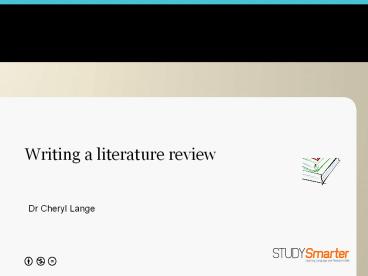Writing a literature review - PowerPoint PPT Presentation
1 / 13
Title:
Writing a literature review
Description:
Writing a literature review Dr Cheryl Lange Integral aspects of academic work Developing a literature review There are a number of stages in writing a literature review. – PowerPoint PPT presentation
Number of Views:152
Avg rating:3.0/5.0
Title: Writing a literature review
1
Writing a literature review
Dr Cheryl Lange
2
Integral aspects of academic work
3
Developing a literature review
- There are a number of stages in writing a
literature review. - Survey the literature
- Develop an understanding of the issues
- Subject your understanding to critical thinking
processes - Develop a series of reasoned arguments that lead
to your hypothesis/research question - Begin writing your review
4
Managing information
- If you are going to be collecting a large number
of journal articles, book chapters etc, you will
need a system for managing it all. - What is your system?
- My approach to collecting and organising the
literature I need for my research is
5
Reading and making notes towards writing
critically
- These tips may help.
- Read with a clear purpose.
- Ask yourself What do I already know?, What do
I predict? before you start each article etc. - Note make/mind map main points, i.e. actively
engage with what you read. - Make tentative evaluations about the content as
you read. - Summarise similarities/differences in
perspective, etc of articles you read
6
Effective reading and note making
turns
Information
into
Knowledge
and
Understanding
7
Thinking about your literature review
- Prompts to focus your thinking
- My research is important because
- What I propose to do in this study is
- What am I looking for in the literature is
- My present understanding of my research area is
- The main schools of thought/theoretical
perspectives in my area are - The great debates my area are ...
- When reading the literature I wonder about
- What remains unclear is ...
8
Introduction
- Identify general topic set context
- Mention overall trends or theoretical/methodologic
al conflicts or gaps or new perspectives - Explain criteria used in analysing/comparing
literature - Describe how review will be organised.
9
Body
- Group studies according to common denominators
e.g. methodology, themes, chronology, benchmark
studies - Summarize individual studies /articles according
to importance (number of words denotes
significance) - Use clear
- umbrella statements (topic sentences) at
beginning of paragraphs - signposts in each paragraph
- Conclude key paragraphs with brief so what
statements to aid readers understanding of
analyses and comparisons
10
Conclusion
- Summarize major contributions of significant
studies maintain focus established in
introduction - Evaluate current state of knowledge under review
e.g. - flaws in methodology
- inconsistencies in theories/finding
- areas of pertinent future study
- Provide some insight into relationship between
topic of literature review and larger area of
study e.g. discipline, profession etc.
11
Judging the quality of a literature review
High quality dissertation Marginal dissertation
Expert use of the literature in design of the study and discussion of the findings. Thorough, clear and incisive reporting of the literature, comprehensive and definitive. Inadequate coverage or focus of the literature in relation to the study. Inaccuracies and omissions in referencing. Discussion that was devoid of reference to the literature.
Literature review Use and application - Centre
for the Study of Research Training Impact,
University of Newcastle
12
Some useful links
- UWA library holdings of Masters and PhD theses
http//www.library.uwa.edu.au/students/postgraduat
es/theses - PhD focused http//www.newcastle.edu.au/research-c
entre/sorti/publications/phd-2008.html - University of Wisconsin http//writing.wisc.edu/Ha
ndbook/CriReadingBook.html - How to read and engineering research paper
http//cseweb.ucsd.edu/wgg/CSE210/howtoread.html - Blog by Jo Edmonston, UWA- Graduate Education
Officer http//myresearchspace.grs.uwa.edu.au/pgwr
itinggroup/
13
Searching for answers? What are your
questions?
- Drop in 1pm - 2pm during semester teaching weeks
Reid Library Mon, Wed, Thurs Science
Library Tues Fri - Individual consultations make your appointment
and submit your draft at least 2 days prior to
when you want your consultation. - Lunch time workshops (see STUDYSmarter Workshop
Calendar) - Contact detailsPhone 6488 2423 - Student
Support Reception www.studysmarter.uwa.edu.austu
dy.smarter_at_uwa.edu.aucheryl.lange_at_uwa.edu.au































